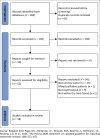The psychosocial implications of cervical cancer in women living in sub-Saharan Africa
- PMID: 40035106
- PMCID: PMC11886587
- DOI: 10.4102/curationis.v48i1.2618
The psychosocial implications of cervical cancer in women living in sub-Saharan Africa
Abstract
Background: A cervical cancer diagnosis has several implications for women's lives. Living with cervical cancer in the context of sub-Sahara Africa's unique challenges can have a devastating effect on psychosocial health.
Objectives: This study describes the publication output reporting psychosocial implications of cervical cancer for women living in sub-Saharan Africa.
Method: A scoping review was conducted using the keywords Africa and cervical cancer in combination with psychosocial, psychological, social, spiritual, cultural and financial to search five databases. A data extraction sheet was developed to capture the relative data, which was analysed using content analysis and descriptive statistics. Of the 294 articles initially identified, 18 were included in the review.
Results: The majority of the studies (66.7%; n = 12) were qualitative. They focussed on five psychosocial domains - psychological including a lack of knowledge, misunderstanding and unmet information needs, the omnipresent experience of fear and sexual problems as well as social, cultural, spiritual and financial implications.
Conclusion: Work focussing on the psychosocial implications of cervical cancer in women living in sub-Saharan Africa is limited. Only one study focussed specifically on a psychosocial domain, the rest reported little about psychosocial issues. There is an urgent need for research that focusses exclusively on psychosocial health, separate from other studies.Contribution: To the best of our knowledge, this is the first study synthesising research conducted on this specific topic. We mapped the extent of the current evidence base, identified gaps and highlighted areas requiring additional inquiry.
Keywords: cervical cancer; nursing; psychosocial implications; scoping review; sub-Saharan Africa.
Conflict of interest statement
The authors declare that they have no financial or personal relationships that may have inappropriately influenced them in writing this article. The author, J.E.M., serves as an editorial board member of this journal. The peer review process for this submission was handled independently, and the author had no involvement in the editorial decision-making process for this manuscript. The author has no other competing interests to declare.
Figures
References
-
- Araya, L.T., Fenta, T.G., Sander, B., Gebremariam, G.T. & Gebretekle, G.B., 2020, ‘Health-related quality of life and associated factors among cervical cancer patients at Tikur Anbessa specialized hospital, Addis Ababa, Ethiopia’, Health and Quality of Life Outcomes 18, 1–9. 10.1186/s12955-020-01319-x - DOI - PMC - PubMed
-
- Arksey, H. & O’Malley, L., 2005, ‘Scoping studies: Towards a methodological framework’, International Journal of Social Research Methodology 8(1), 19–32. 10.1080/1364557032000119616 - DOI
-
- Athanas, R., Gasto, F. & Renatha, S., 2020, ‘Factors influencing truth-telling by healthcare providers to terminally ill cancer patients at Ocean Road Cancer Institute in Dar-es-Salaam, Tanzania’, South African Journal of Bioethics and Law 13, 108–113. 10.7196/SAJBL.2020.v13i2.00706 - DOI
Publication types
MeSH terms
LinkOut - more resources
Full Text Sources
Medical

